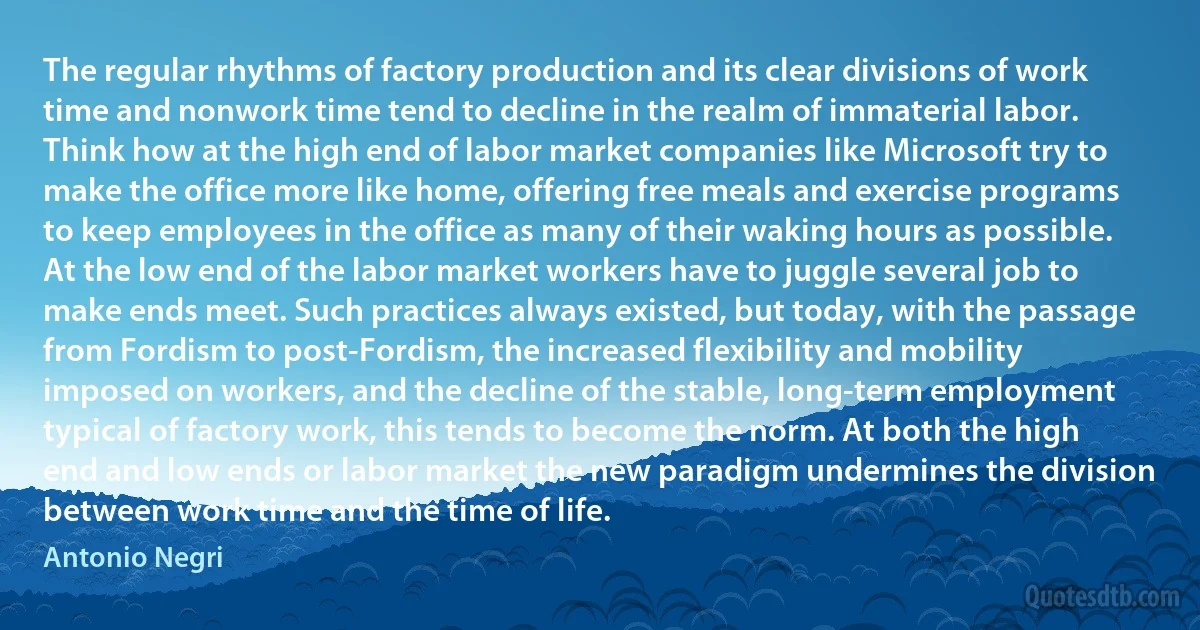
The regular rhythms of factory production and its clear divisions of work time and nonwork time tend to decline in the realm of immaterial labor. Think how at the high end of labor market companies like Microsoft try to make the office more like home, offering free meals and exercise programs to keep employees in the office as many of their waking hours as possible. At the low end of the labor market workers have to juggle several job to make ends meet. Such practices always existed, but today, with the passage from Fordism to post-Fordism, the increased flexibility and mobility imposed on workers, and the decline of the stable, long-term employment typical of factory work, this tends to become the norm. At both the high end and low ends or labor market the new paradigm undermines the division between work time and the time of life.
Antonio NegriRelated topics
clear end free high home hours job juggle labor life low market meet mobility norm office paradigm passage possible production stable think time try typical work today divisions ends microsoftRelated quotes
If employment is falling off, what is the lesson? The lesson is that our home trade, our domestic consumption, must have decreased in a larger proportion than our foreign trade has increased. (Hear, hear.) The competition from abroad has grown more and more severe, and, on the whole, taking our trade as a whole, it must have declined if the employment in trade has decreased. (Hear, hear.) Wages have been reduced. You have only to read the papers to see almost daily some trade or another has to submit to a reduction. That, then, is not a proof of boundless prosperity. It is a proof of comparative decline, and, in my judgment, the handwriting is on the wall, there to be read by every impartial man; and, though I contemplate no immediate catastrophe, I say the situation calls for preparation while there is still time to find a remedy. (Cheers.)

Joseph Chamberlain
[N]othing is easier to attain than full employment... All we would have to do, for instance, would be to continue a war-economy at no more, perhaps, than half its present level. Or we could adopt some sort of state socialism, under which the surplus resources... would be employed on non-economic projects, it makes... little difference what twentieth century equivalent of the Egyptian pyramids... so long as we do not use the surplus labor to produce ordinary economic goods. ...But we refuse to accept the kind of society to which either [a permanent war economy or state socialism] would lead. We demand more than a stable society, we demand a good society. Specifically, we demand of our economic system... that it produce goods... that add to the wealth... and... that these goods be produced... under... the free enterprise system.

Peter Drucker
By The middle of The 1920s General Motors had accomplished some things, but apart from survival and reorganization, they were more in the realm of the mind than of reality. We knew, as I have related, the strategy with which we proposed to approach the car business, how we proposed to manage the enterprise financially, and the relationships we wanted to establish among persons in different roles. But by the end of 1924 little of this was reflected in Our activities in the automobile market. That our volume of business had increased after the slump of 1921 - and especially in 1923 - could be attributed less to our own wits than to the improvement in the general economy and the rising demand for automobiles. While internally we had made much progress, externally we had marked time. But the time had come to act.

Alfred P. Sloan
Certain contemporary overenthusiastic market socialists tend, contrariwise, to forget that the market is intrinsically repugnant, because they are blinded by their belated discovery of the market's instrumental value. It is the genius of the market that it (1) recruits low-grade motives to (2) desirable ends; but (3) it also produces undesirable effects, including significant unjust inequality. In a balanced view, all three sides of that proposition must be kept in focus, but many market socialists now self-deceptively overlook (1) and (3). Both (1) and (2) were kept in focus by the pioneering eighteenth-century writer Bernard Mandeville, whose market-praising Fable of the Bees was subtitled Private Vices, Public Benefits. Many contemporary celebrants of the market play down the truth in the first part of that subtitle.

Gerald Cohen
Recently I have gone back to church regularly with a new focus to understand as best I can what it is that makes Christianity so vital and powerful in the lives of billions of people today, even though almost 2000 years have passed since the death and resurrection of Christ. Although I suspect I will never fully understand, I now think the answer is very simple: it's true. God did create the universe about 13.7 billion years ago, and of necessity has involved Himself with His creation ever since. The purpose of this universe is something that only God knows for sure, but it is increasingly clear to modern science that the universe was exquisitely fine-tuned to enable human life. We are somehow critically involved in His purpose. Our job is to sense that purpose as best we can, love one another, and help Him get that job done.

Richard Smalley
